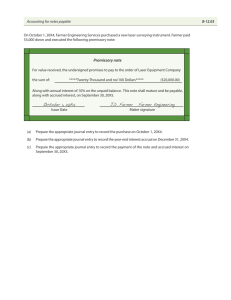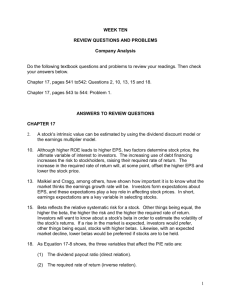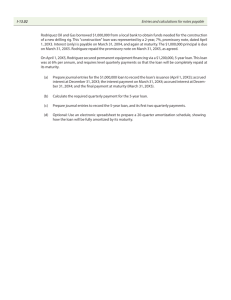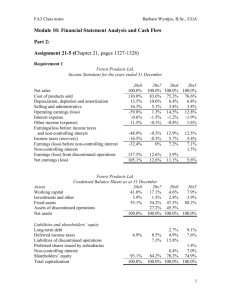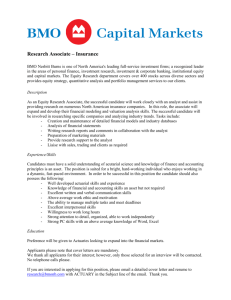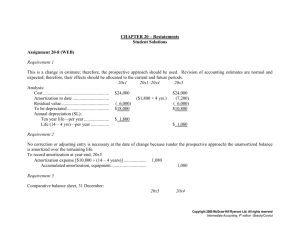Appendix 3 - Hong Kong Institute of Certified Public Accountants
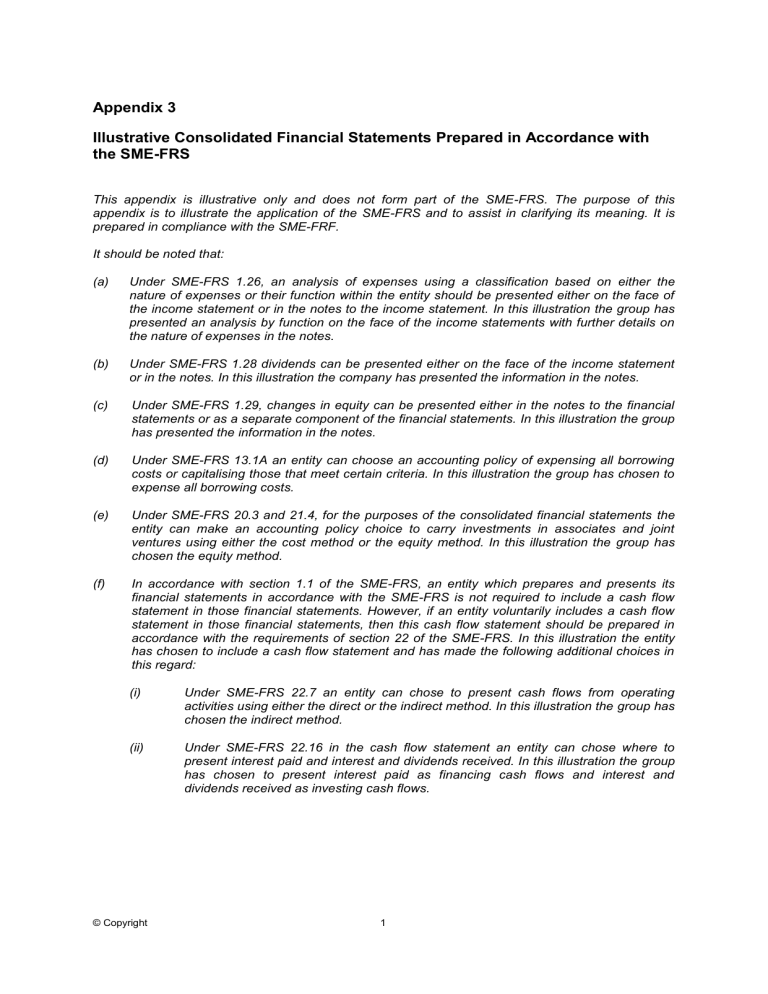
Appendix 3
Illustrative Consolidated Financial Statements Prepared in Accordance with the SME-FRS
This appendix is illustrative only and does not form part of the SME-FRS. The purpose of this appendix is to illustrate the application of the SME-FRS and to assist in clarifying its meaning. It is prepared in compliance with the SME-FRF.
It should be noted that:
(a) Under SME-FRS 1.26, an analysis of expenses using a classification based on either the nature of expenses or their function within the entity should be presented either on the face of the income statement or in the notes to the income statement. In this illustration the group has presented an analysis by function on the face of the income statements with further details on the nature of expenses in the notes.
(b) Under SME-FRS 1.28 dividends can be presented either on the face of the income statement or in the notes. In this illustration the company has presented the information in the notes.
(c) Under SME-FRS 1.29, changes in equity can be presented either in the notes to the financial statements or as a separate component of the financial statements. In this illustration the group has presented the information in the notes.
(d) Under SME-FRS 13.1A an entity can choose an accounting policy of expensing all borrowing costs or capitalising those that meet certain criteria. In this illustration the group has chosen to expense all borrowing costs.
(e) Under SME-FRS 20.3 and 21.4, for the purposes of the consolidated financial statements the entity can make an accounting policy choice to carry investments in associates and joint ventures using either the cost method or the equity method. In this illustration the group has chosen the equity method.
(f) In accordance with section 1.1 of the SME-FRS, an entity which prepares and presents its financial statements in accordance with the SME-FRS is not required to include a cash flow statement in those financial statements. However, if an entity voluntarily includes a cash flow statement in those financial statements, then this cash flow statement should be prepared in accordance with the requirements of section 22 of the SME-FRS. In this illustration the entity has chosen to include a cash flow statement and has made the following additional choices in this regard:
(i) Under SME-FRS 22.7 an entity can chose to present cash flows from operating activities using either the direct or the indirect method. In this illustration the group has chosen the indirect method.
(ii) Under SME-FRS 22.16 in the cash flow statement an entity can chose where to present interest paid and interest and dividends received. In this illustration the group has chosen to present interest paid as financing cash flows and interest and dividends received as investing cash flows.
© Copyright 1
SME GROUP
CONSOLIDATED INCOME STATEMENT for the year ended 31 December 20X5
Revenue
Cost of sales
Other income
Distribution costs
Administrative expenses
Other operating expenses
Share of profit of associate
Share of profit of joint venture
Finance costs
Profit before tax
Income tax expense
Profit for the year
Profit attributable to the equity shareholders
Profit attributable to non-controlling interest
Note
2
3
4
6
20X5
HK$
29,054,180
(19,114,120)
9,940,060
23,680
(702,200)
(7,240,955)
(423,050)
30,000
60,000
(53,530)
1,634,005
(225,050)
1,408,955
1,305,220
103,735
1,408,955
20X4
HK$
24,834,610
(16,490,300)
8,344,310
23,060
(627,200)
(5,901,420)
(400,120)
50,000
80,000
(63,130)
1,505,500
(225,430)
1,280,070
1,173,770
106,300
1,280,070
The accompanying Accounting Policies and Explanatory Notes form an integral part of, and should be read in conjunction with, these financial statements.
© Copyright 2
SME GROUP
CONSOLIDATED STATEMENT OF FINANCIAL POSITION as at 31 December 20X5
Non-current assets
Note
7
8
20X5
HK$
5,270,300
2,310,000
Property, plant and equipment
Intangible assets (including goodwill)
Investment in associate
Investment in joint venture
Other long-term investments
Current assets
Inventories
Deposits and prepayments
Trade and other receivables
Cash and bank balances
Current liabilities
Income tax payable
Bank overdraft – secured
Bank loan – secured
Obligations under finance leases
Trade payables
Net Current Assets
Non-current liabilities
Bank loan – secured
Obligations under finance leases
Net Assets
14
14
15
14
15
9
10
11
12
13
420,000
540,000
310,000
8,850,300
1,796,025
147,040
1,005,150
1,096,800
4,045,015
(225,050)
(388,840)
(900,000)
(64,745)
(2,222,830)
(3,801,465)
243,550
(100,000)
-
(100,000)
8,993,850
Equity
Share capital: issued & fully paid
100,000 ordinary shares
Retained earnings
Total equity attributable to the shareholders of the company
Non-controlling interest
Total equity
16
16
100,000
8,422,115
8,522,115
471,735
8,993,850
20X4
HK$
4,104,010
2,500,000
400,000
500,000
-
7,504,010
1,964,590
261,910
1,113,535
1,083,500
4,423,535
(225,430)
(533,520)
(900,000)
(62,805)
(2,046,150)
(3,767,905)
655,630
(400,000)
(64,745)
(464,745)
7,694,895
100,000
7,226,895
7,326,895
368,000
7,694,895
Approved on behalf of the Board by: ____________________
Director
____________________
Director
© Copyright 3
The accompanying Accounting Policies and Explanatory Notes form an integral part of, and should be read in conjunction with, these financial statements.
SME GROUP
CONSOLIDATED STATEMENT OF CASH
FLOWS 1 for the year ended 31 December 20X5
Profit before taxation
Adjustments for non-operating or non-cash items:
Interest expense
Interest income
Dividend income from long term investment
Depreciation and amortisation
Gain on disposal of fixed assets
Share of profit of associate
Share of profit of joint venture
Exchange losses on cash balances
Changes in working capital:
Decrease/ (increase) in inventories
Decrease in trade and other receivables
Decrease/ (increase) in deposits and prepayment
Increase in trade and other payables
Cash generated from operations
Hong Kong profits tax paid
Not e
20X5
HK$
1,634,005
53,530
(6,200)
(12,120)
905,770
(23,680)
(30,000)
(60,000)
5,505
168,565
108,385
114,870
176,680
3,035,310
(225,430)
20X4
HK$
1,505,500
63,130
(5,600)
(7,470)
647,820
(23,060)
(50,000)
(80,000)
3,920
(40,078)
24,118
(156,910)
11,820
1,893,190
(237,300)
Net cash generated from operating activities
Investing activities
2,809,880 1,655,890
Payment for purchase of property, plant and equipment
Proceeds from disposals of property, plant and equipment
Payment for purchase of investments
Dividend received from the associate
Dividend received from the joint venture
Dividend received from long term investment
Interest received
Net cash outflow for acquisition of a subsidiary 17
(2,031,530)
673,150
(310,000)
10,000
20,000
12,120
6,200
(500,000)
(1,217,670)
623,060
-
20,000
30,000
7,470
5,600
-
Net cash used in investing activities (2,120,060) (531,540)
1
In accordance with section 1.1 of the SME-FRS, an entity which prepares and presents its financial statements in accordance with the SME-FRS is not required to include a cash flow statement in those financial statements. However, if an entity voluntarily includes a cash flow statement in those financial statements, then this cash flow statement should be prepared in accordance with the requirements of section 22 of the SME-FRS.
© Copyright 4
...continued
SME GROUP
CONSOLIDATED STATEMENT OF CASH
FLOWS for the year ended 31 December 20X5
Financing activities
Dividend paid
Proceeds from new bank loans
Repayment of bank loans
Repayment of finance lease payable
Interest paid
Net cash used in financing activities
Net increase/ (decrease) in cash and cash equivalents
Exchange losses on cash balances
Cash and cash equivalents at 1 January
Cash and cash equivalents at 31 December
Not e
13 continued…
20X5
HK$
(110,000)
600,000
(900,000)
(62,805)
(53,530)
(526,335)
163,485
(5,505)
549,980
707,960
20X4
HK$
The accompanying Accounting Policies and Explanatory Notes form an integral part of, and should be read in conjunction with, these financial statements.
-
-
(1,300,000)
(61,300)
(63,130)
(1,424,430)
(300,080)
(3,920)
853,980
549,980
© Copyright 5
SME GROUP
ACCOUNTING POLICIES AND EXPLANATORY NOTES TO THE FINANCIAL STATEMENTS for the year ended 31 December 20X5
Reporting entity
SME Holdings Limited (the company) is a company incorporated in Hong Kong with limited liability.
The company’s registered office is located at 9/F, 28 Nowhere Street, Kowloon, Hong Kong. SME group consists of the Company, its 90% owned subsidiary, SME (Manufacturing) Limited, which adopted the brand name “Fun Times” for its business and its wholly owned subsidiary SME (Trading)
Limited, which the group acquired in the current year. The Group’s principal activities are the manufacture and sale of toys.
1. Basis of preparation and accounting policies
The company and each of its subsidiaries qualify for the reporting exemption as small private companies under section 359(1)(a) of the Hong Kong Companies Ordinance (Cap. 622), and the group as a whole qualifies for the reporting exemption as a small private group under section 359(2). The group is therefore entitled to prepare and present its financial statements in accordance with the Small and Medium-sized Entity Financial Reporting Standard (SME-
FRS) issued by the Hong Kong Institute of Certified Public Accountants.
These consolidated financial statements comply with the SME-FRS and have been prepared under the accrual basis of accounting and on the basis that the group is a going concern.
The measurement base adopted is the historical cost convention.
The following are the specific accounting policies that are necessary for a proper understanding of the financial statements:
(a) Subsidiaries and non-controlling interests
Subsidiaries are entities controlled by the group. Control exists when the group has the power to govern the financial and operating policies of an entity so as to obtain benefits from its activities. In assessing control, potential voting rights that presently are exercisable are taken into account.
An investment in a subsidiary is consolidated into the consolidated financial statements from the date that control commences until the date that control ceases.
Intra-group balances and transactions and any unrealised profits arising from intragroup transactions are eliminated in full in preparing the consolidated financial statements. Unrealised losses resulting from intra-group transactions are eliminated in the same way as unrealised gains but only to the extent that there is no evidence of impairment.
Non-controlling interests represent that portion of the profit or loss and net assets of a subsidiary attributable to equity interests that are not owned, directly or indirectly through subsidiaries, by the company.
Non-controlling interests are presented in the consolidated statement of financial position within equity, separately from equity attributable to the equity shareholders of the company. Non-controlling interests in the results of the group are presented separately on the face of the consolidated income statement.
© Copyright 6
(b)
(c)
Associates and joint ventures
An associate is an entity in which the group or company has significant influence, but not control or joint control, over its management, including participation in the financial and operating policy decisions.
A joint venture is a contractual arrangement whereby the group or company and other parties undertake an economic activity through an entity that is separate from the parties and subject to joint control.
An investment in an associate or a joint venture is accounted for in the consolidated financial statements under the equity method. Under the equity method, the investment is initially recorded at the transaction price (including transaction costs) and is subsequently adjusted to reflect the group’s share of profit or loss after the date of acquisition. The group ’s share of the profit or loss of the associate and joint venture is recognised in the consolidated income statement. Distributions received from an associate or a joint venture reduce the carrying amount of the investments.
When the group’s share of losses exceeds its interest in the associate or the joint venture , the group’s interest is reduced to nil and recognition of further losses is discontinued except to the extent that the group has incurred legal or constructive obligations or made payments on behalf of the investee.
Unrealised profits and losses resulting from upstream and downstream transactions are eliminated to the extent of the group ’s interest in the associate and joint venture.
‘Upstream’ transactions are, for example, sales of assets from an associate or a joint venture to the group . ‘Downstream’ transactions are, for example, sales of assets from the group to an associate or a joint venture. Unrealised losses on such transactions may provide evidence of an impairment of the asset transferred.
In the company’s statement of financial position, investments in associates and joint ventures are stated at cost less impairment losses (see note 1(j)).
Business combinations and goodwill
Acquisitions of businesses are accounted for using the purchase method. The cost of a business combination is the aggregate of the fair values, at the acquisition date, of assets given, liabilities incurred or assumed by the group and the equity instruments issued by the group in exchange for the control of the acquiree. Any costs directly attributable to the business combination are recognised in the income statement in the periods in which the costs are incurred.
At the acquisition date, the identifiable assets acquired and the liabilities assumed are recognised at their fair values.
Goodwill represents the excess of
(i)
(ii) the cost of the business combination; over the net fair value of the acquiree’s identifiable assets and liabilities measured as at the acquisition date.
When (ii) is greater than (i), then this excess is recognised immediately in profit or loss as a gain on a bargain purchase.
Goodwill acquired in a business combination is stated at cost less any accumulated amortisation and any accumulated impairment losses (see note 1(k)). Goodwill is amortised over its estimated useful life not exceeding 5 years using the straight-line method.
© Copyright 7
(d) Revenue
Revenue is recognised when it is probable that the economic benefits will flow to the company and when the revenue can be measured reliably, on the following bases:
(i)
(ii) sale of goods is recognised when the goods are delivered and the risks and rewards of ownership have passed to the customer; rental income is recognised on a time proportion basis over the lease terms;
(e)
(f)
(iii)
(iv) interest income is recognised on a time proportion basis taking into account the principal outstanding and the interest applicable; and dividend income is recognised when the shareholder ’s right to receive payment is established.
Borrowing costs
Borrowing costs are recognised as an expense in the period in which they are incurred.
Foreign exchange
(g)
(h)
The reporting currency of the company and its subsidiaries is Hong Kong Dollars, which is the currency of the primary economic environment in which each of these entities operates.
Foreign currency transactions are converted at the exchange rate applicable at the transaction date. Foreign currency monetary items are translated into Hong Kong
Dollars using exchange rates applicable at the end of the reporting period. Gains and losses on foreign exchange are recognised in the income statement.
Taxation
Income tax expense represents current tax expense. The income tax payable represents the amounts expected to be paid to the taxation authority, using the tax rates (and tax laws) that have been enacted or substantively enacted by the end of the reporting period.
Deferred tax is not provided.
Property, plant and equipment
Property, plant and equipment are stated at cost less accumulated depreciation and accumulated impairment losses.
The depreciable amount of an item of property, plant and equipment is allocated on a systematic basis over its estimated useful life using the straight-line method. The principal annual rates used for depreciation are as follows:
Leasehold land Over the lease terms
Buildings
Furniture, fixtures and equipment
2%
10%-20%
© Copyright 8
(i)
(j)
(k)
(l)
(m)
Intangible assets (other than goodwill)
Intangible assets are stated at cost less accumulated amortisation and accumulated impairment losses and are amortised on a systematic basis over their estimated useful lives using the straight-line method.
Investments
Current investments are stated at the lower of cost and net realisable value. Longterm investments are stated at cost less accumulated impairment losses.
Impairment of assets
An assessment is made at the end of each reporting period to determine whether there is any indication of impairment or reversal of previous impairment, including items of property, plant and equipment, intangible assets, long term investments, goodwill, interest in subsidiaries and interests in associates and joint ventures. In the event that an asset’s carrying amount exceeds its recoverable amount, the carrying amount is reduced to recoverable amount and an impairment loss is recognised in the income statement.
An impairment loss in respect for goodwill is not reversed. In respect of assets other than goodwill, a previously recognised impairment loss is reversed only if there has been a change in the estimates used to determine the recoverable amount, however not to an amount higher than the carrying amount that would have been determined
(net of amortisation or depreciation), had no impairment losses been recognised for the asset in prior years.
Leases
Leases that transfer substantially all the rewards and risks of ownership of assets to the company are accounted for as finance leases. At the inception of a finance lease, the cost of the leased asset is capitalised at the fair value of the leased asset or, if lower, at the present value of the minimum lease payments. Lease payments are apportioned between the finance charges and reduction of the lease liability so as to achieve a constant rate of interest on the remaining balance of the liability. Finance charges are charged to the income statement.
Capitalised leased assets are depreciated over the shorter of the estimated useful life of the asset or the lease term.
Leases where substantially all the risks and rewards of ownership of assets are not transferred to the lessee are accounted for as operating leases. Annual rents applicable to such operating leases are charged to the income statement on a straight-line basis over the lease term.
Inventories
Inventories are stated at the lower of cost (using a first-in-first-out basis) and net realisable value. In arriving at net realisable value an allowance has been made for deterioration and obsolescence.
© Copyright 9
2.
3.
(n) Trade and other receivables
Trade and other receivables are stated at estimated realisable value after each debt has been considered individually. Where the payment of a debt becomes doubtful a provision is made and charged to the income statement.
Cash and cash equivalents 2 (o)
Cash and cash equivalents comprise cash at bank and on hand and short-term, highly liquid investments that are readily convertible into known amounts of cash and which are subject to an insignificant risk of changes in value. Bank overdrafts that are repayable on demand and form an integral part of the g roup’s cash management are also included as a component of cash and cash equivalents for the purpose of the consolidated cash flow statement.
Revenue
An analysis of the group’s revenue is as follows:
Sale of goods
Rental income
Interest income
Dividend income from long term investment
20X5
HK$
28,957,860
78,000
6,200
12,120
29,054,180
20X4
HK$
24,753,540
68,000
5,600
7,470
24,834,610
Finance costs
Interest on bank loan and overdraft
Interest on finance leases
20X5
HK$
41,030
12,500
53,530
20X4
HK$
55,100
8,030
63,130
2
In accordance with section 1.1 of the SME-FRS, an entity which prepares and presents its financial statements in accordance with the SME-FRS is not required to include a cash flow statement in those financial statements. However, if an entity voluntarily includes a cash flow statement in those financial statements, then this cash flow statement should be prepared in accordance with the requirements of section 22 of the SME-FRS. Consequently, this policy note is only appropriate if an entity chooses to present a cash flow statement.
© Copyright 10
4.
5.
6.
Profit before tax
Profit before tax is arrived at:
After crediting the following item:
Gain on disposal of property, plant and equipment
And after charging the following items:
Depreciation
Amortisation*
Key management personnel’s remuneration
Other staff costs
Exchange losses, net
Provision for inventories
Provision for bad and doubtful debts
Note
7
8
20X5
HK$
23,680
(565,770)
(340,000)
(762,850)
(1,522,570)
(16,250)
(106,000)
(98,800)
20X4
HK$
23,060
322,820)
(325,000)
(470,000)
(1,968,920)
(19,920)
(86,700)
(65,600)
* The amortisation of acquired brand name and goodwill for the year is included in “Other operating expenses ” on the face of the income statement.
Directors’ remuneration
Directors’ remuneration disclosed pursuant to section 383(1) of the Companies Ordinance is as follows:
Fees
Retirement benefits
Other emoluments
Income tax expense
20X5
HK$
350,000
12,000
108,000
470,000
20X4
HK$
350,000
12,000
108,000
470,000
Hong Kong profits tax has been provided at the rate of 16.5% (20X4: 16.5%) on the estimated assessable profits arising in Hong Kong during the year.
Tax charge for the year
Overprovision in prior years
20X5
HK$
235,250
(10,200)
225,050
20X4
HK$
225,430
-
225,430
© Copyright 11
7.
8.
Property, plant and equipment
Cost:
At 1 January 20X5
Additions
Addition through acquisition of a subsidiary (see note 17)
Disposals
At 31 December 20X5
Accumulated depreciation and impairment losses:
At 1 January 20X5
Depreciation for the year
Written back on disposal
At 31 December 20X5
Net carrying amount:
At 31 December 20X5
At 31 December 20X4
Leasehold land and buildings
HK$
5,040,000
-
-
-
5,040,000
2,160,000
80,000
-
2,240,000
2,800,000
2,880,000
Furniture, fixtures and equipment
HK$
2,428,180
2,031,530
350,000
(1,527,470)
3,282,240
1,204,170
485,770
(878,000)
811,940
2,470,300
1,224,010
The carrying amount of equipment held under finance leases at 31 December 20X5 was
HK$81,000 (20X4: HK$108,000).
Total
HK$
7,468,180
2,031,530
350,000
(1,527,470)
8,322,240
3,364,170
565,770
(878,000)
3,051,940
5,270,300
4,104,010
Intangible assets
Cost:
At 1 January 20X5
Addition through acquisition of a subsidiary (see note 17)
At 31 December 20X5
Accumulated amortisation:
At 1 January 20X5
Amortisation for the year
At 31 December 20X5
Net carrying amount:
At 31 December 20X5
At 31 December 20X4
Acquired brand name
HK$
3,000,000
-
3,000,000
600,000
300,000
900,000
2,100,000
2,400,000
Goodwill
HK$
125,000
150,000
275,000
25,000
40,000
65,000
210,000
100,000
Total
HK$
3,125,000
150,000
3,275,000
625,000
340,000
965,000
2,310,000
2,500,000
© Copyright 12
9.
10.
11.
12.
The acquired brand name is being amortised over 10 years and the goodwill is being amortised over 5 years.
Interest in associate
Interest in an associate
20X5
HK$
20X4
HK$
420,000 400,000
The following list contains the particulars of the associate which is an unlisted corporate entity and principally affected the results or assets of the Group:
Name of the associate
SME Associate Limited
Place of incorporation and principal place of operation
Hong Kong
% of ownership and voting power
25%
Nature of business
Provision of logistic management services
SME Associate Limited entered into a bank loan agreement for HK$2,000,000 with ABC Bank on 30 September 20X3. The agreement restricts SME Associate Limited from paying any cash dividends prior to the full repayment of the bank loan, which is scheduled on 30
September 20X6.
Interest in joint venture
Interest in a joint venture
20X5
HK$
540,000
20X4
HK$
500,000
The following list contains the particulars of the joint venture which is an unlisted corporate entity and principally affected the results or assets of the Group:
Name of the jointly controlled entity
SME JV Limited
Place of incorporation and principal place of operation
Hong Kong
% of ownership and voting power
50%
Other long term investments
Nature of business
Operation of retail stores
Listed equity securities, at cost
20X5
HK$
310,000
The market value of listed equity securities as at 31 December 20X5 was HK$325,190.
20X4
HK$
-
Inventories
Inventories comprise entirely of stock in trade.
© Copyright 13
13.
14.
15.
Cash and cash equivalents
Cash at bank and in hand
Bank overdrafts
Cash and cash equivalents in the consolidated cash flow statement 3
20X5
HK$
1,096,800
(388,840)
707,960
20X4
HK$
1,083,500
(533,520)
549,980
Secured bank loan and overdrafts
At 31 December 20X5, the bank loan and bank overdraft were repayable as follows:
Within 1 year or on demand
After 1 year
20X5
HK$
20X4
HK$
1,288,840
100,000
1,388,840
1,433,520
400,000
1,833,520
The group’s bank loan and overdraft are secured by a floating charge over the group’s leasehold land and building with aggregate carrying value as at 31 December 20X5 of
HK$2,800,000 (20X4: HK$2,880,000).
Obligations under finance leases
The carrying value of lease payments under finance leases are as follows:
Not later than one year
Later than one year
20X5
HK$
64,745
-
64,745
20X4
HK$
62,805
64,745
127,550
3
In accordance with section 1.1 of the SME-FRS, an entity which prepares and presents its financial statements in accordance with the SME-FRS is not required to include a cash flow statement in those financial statements. However, if an entity voluntarily includes a cash flow statement in those financial statements, then this cash flow statement should be prepared in accordance with the requirements of section 22 of the SME-FRS. Consequently, this reconciliation is only required to be disclosed if an entity chooses to present a cash flow statement.
© Copyright 14
16. Capital and reserves of the company and the group
(a) Movement in components of equity of the group
Balance as at 1 January
20X5
Profit for the year
Dividend paid (Interim dividend of HK$1.1 per share)
Balance as at 31
December 20X5
(b)
Share capital
Retained earnings
HK$ HK$
100,000 7,226,895
- 1,305,220
- (110,000)
100,000 8,422,115
Total shareholders' equity
HK$
Noncontrolling interest
HK$
7,326,895
1,305,220
368,000
103,735
Total equity
HK$
7,694,895
1,408,955
(110,000)
8,522,115
Movement in components of equity of the company
-
471,735
(110,000)
8,993,850
Balance as at 1 January 20X5
Profit for the year
Dividend paid (Interim dividend of HK$1.1 per share)
Balance as at 31 December 20X5
Share capital
HK$
100,000
-
-
100,000
Retained earnings
HK$
2,391,650
342,330
(110,000)
2,623,980
Total equity
HK$
2,491,650
342,330
(110,000)
2,723,980
© Copyright 15
17. Business combination
On 30 June 20X5, the group acquired the entire equity interests in SME (Trading) Limited for business expansion. SME (Trading) Limited is incorporated in Hong Kong and engages in retail sales of toys.
The acquisition had the following effect on the g roup’s assets and liabilities on the date of acquisition:
Property, plant and equipment
Inventory
Trade and other receivables
Deposits and prepayments
Cash at bank
Trade and other payables
Fair value of identifiable net assets
Total consideration, satisfied in cash
Goodwill
Total consideration, satisfied in cash
Less: cash at bank acquired
Net outflow of cash and cash equivalents in respect of the acquisition of subsidiaries 4
Note
7
8
HK$
350,000
52,500
102,300
46,710
50,000
(201,510)
400,000
550,000
150,000
550,000
(50,000)
500,000
4
In accordance with section 1.1 of the SME-FRS, an entity which prepares and presents its financial statements in accordance with the SME-FRS is not required to include a cash flow statement in those financial statements. However, if an entity voluntarily includes a cash flow statement in those financial statements, then this cash flow statement should be prepared in accordance with the requirements of section 22 of the SME-FRS. Consequently, this reconciliation is only required to be disclosed if an entity chooses to present a cash flow statement.
© Copyright 16
18. Statement of financial position of the company
Company-level statement of financial position
Non-current assets
Property, plant and equipment
Investment in subsidiaries
Investment in associate
Investment in joint venture
Current assets
Prepayments
Amount due from subsidiaries
Cash and bank balances
Current liabilities
Trade and other payables
Net Current Assets
Net Assets
Equity
Share capital
Retained earnings
Total equity
(b) Particulars of principal subsidiaries
Name of subsidiaries
SME (Manufacturing)
Limited
SME (Trading) Limited
Place of incorporation and principal place of operation
Hong Kong
Hong Kong
% of ownership and voting power
90%
100%
16
16
Note
18(b)
HK$
20X5
153,750
2,025,000
100,000
150,000
2,428,750
20,000
500,000
10,230
530,230
(235,000)
295,230
2,723,980
100,000
2,623,980
2,723,980
Nature of business
Toys manufacturing
Retail sales of toys
20X4
HK$
205,000
1,475,000
100,000
150,000
1,930,000
20,000
500,000
145,100
665,100
(103,450)
561,650
2,491,650
100,000
2,391,650
2,491,650
19.
© Copyright
Commitments under operating leases
The group had the following total future minimum lease payments payable under noncancellable operating leases:
Within one year
After one year
20X5
HK$
573,060
573,060
1,146,120
20X4
HK$
573,060
1,146,120
1,719,180
17
20.
21.
22.
Contingent liabilities
The group had the following contingent liabilities not provided for in the financial statements:
Guarantee given to the bank in connection with the facility granted to the joint venture
20X5
HK$
500,000
20X4
HK$
-
At 31 December 20X5, a subsidiary of the group had undertaken to guarantee a revolving banking facility granted to the joint venture to the extent of HK$1,000,000. The maximum liability of the group at 31 December 20X5 under the guarantee issued was the outstanding amount of the facility advanced by the bank to the joint venture of HK$500,000.
Other related party transactions
In addition to the transactions and balances detailed elsewhere in these financial statements, the group had the following transactions with related parties:
Goods sold to the joint venture
Trade receivables from the joint venture
Logistic services received from the associate
Trade payables to the associate
20X5
HK$
2,567,890
238,000
589,000
58,000
20X4
HK$
2,356,790
205,120
528,000
52,000
The amounts due from/ to the related parties are unsecured, interest-free and have no fixed terms of repayment/ settlement.
Approval of financial statements
These financial statements were authorised for issue by the company’s Board of Directors on
15 March 20X6.
© Copyright 18
